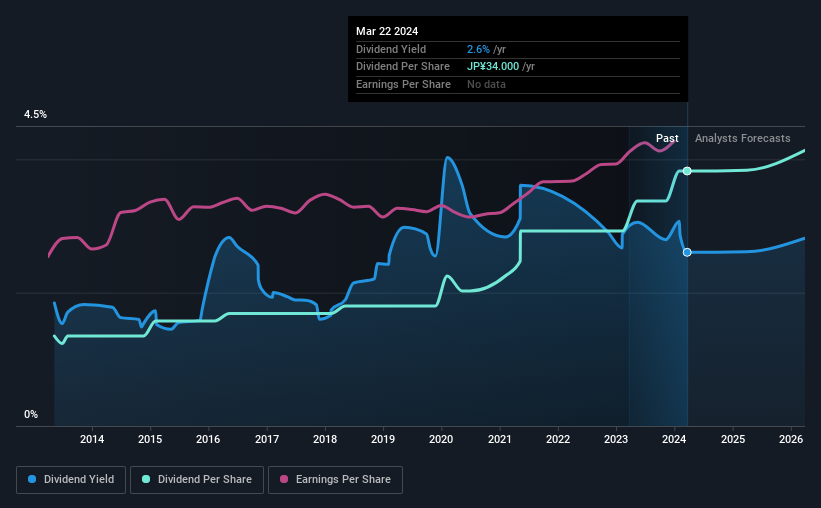
The Chiba Bank, Ltd. (TSE:8331) will increase its dividend from last year's comparable payment on the 1st of July to ¥17.00. Based on this payment, the dividend yield for the company will be 2.6%, which is fairly typical for the industry.
While the dividend yield is important for income investors, it is also important to consider any large share price moves, as this will generally outweigh any gains from distributions. Investors will be pleased to see that Chiba Bank's stock price has increased by 30% in the last 3 months, which is good for shareholders and can also explain a decrease in the dividend yield.
See our latest analysis for Chiba Bank
Chiba Bank's Payment Expected To Have Solid Earnings Coverage
Solid dividend yields are great, but they only really help us if the payment is sustainable.
Having distributed dividends for at least 10 years, Chiba Bank has a long history of paying out a part of its earnings to shareholders. Taking data from its last earnings report, calculating for the company's payout ratio shows 35%, which means that Chiba Bank would be able to pay its last dividend without pressure on the balance sheet.
Looking forward, earnings per share is forecast to rise by 25.9% over the next year. If the dividend continues along recent trends, we estimate the future payout ratio will be 32%, which is in the range that makes us comfortable with the sustainability of the dividend.

Dividend Volatility
Although the company has a long dividend history, it has been cut at least once in the last 10 years. Since 2014, the dividend has gone from ¥12.00 total annually to ¥34.00. This means that it has been growing its distributions at 11% per annum over that time. Chiba Bank has grown distributions at a rapid rate despite cutting the dividend at least once in the past. Companies that cut once often cut again, so we would be cautious about buying this stock solely for the dividend income.
The Dividend Has Growth Potential
With a relatively unstable dividend, it's even more important to see if earnings per share is growing. It's encouraging to see that Chiba Bank has been growing its earnings per share at 6.7% a year over the past five years. Chiba Bank definitely has the potential to grow its dividend in the future with earnings on an uptrend and a low payout ratio.
In Summary
In summary, it's great to see that the company can raise the dividend and keep it in a sustainable range. The dividend has been at reasonable levels historically, but that hasn't translated into a consistent payment. This looks like it could be a good dividend stock going forward, but we would note that the payout ratio has been at higher levels in the past so it could happen again.
Companies possessing a stable dividend policy will likely enjoy greater investor interest than those suffering from a more inconsistent approach. At the same time, there are other factors our readers should be conscious of before pouring capital into a stock. For example, we've picked out 1 warning sign for Chiba Bank that investors should know about before committing capital to this stock. Looking for more high-yielding dividend ideas? Try our collection of strong dividend payers.
New: AI Stock Screener & Alerts
Our new AI Stock Screener scans the market every day to uncover opportunities.
• Dividend Powerhouses (3%+ Yield)
• Undervalued Small Caps with Insider Buying
• High growth Tech and AI Companies
Or build your own from over 50 metrics.
Have feedback on this article? Concerned about the content? Get in touch with us directly. Alternatively, email editorial-team (at) simplywallst.com.
This article by Simply Wall St is general in nature. We provide commentary based on historical data and analyst forecasts only using an unbiased methodology and our articles are not intended to be financial advice. It does not constitute a recommendation to buy or sell any stock, and does not take account of your objectives, or your financial situation. We aim to bring you long-term focused analysis driven by fundamental data. Note that our analysis may not factor in the latest price-sensitive company announcements or qualitative material. Simply Wall St has no position in any stocks mentioned.
About TSE:8331
Chiba Bank
Provides banking products and services in Japan and internationally.
Excellent balance sheet and good value.

